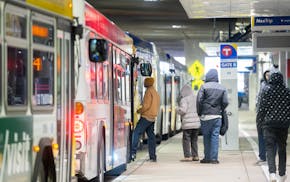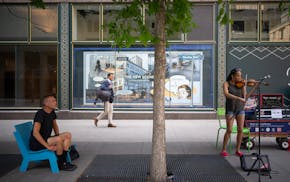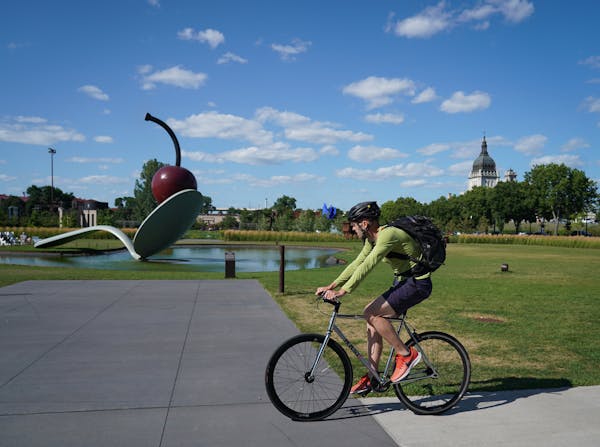People talk about Minneapolis.
The loudest voices, with the least to say, tend to come from people who won't set foot in the place.
Adrian Wilson hopes you'll come to his city and see what he sees in it.
His Minneapolis is a joyful, colorful place, bursting with music, bright murals, friendly faces. The neighborhood farmers market beckons. The skyline glitters like a tiara.
So Wilson, a documentary filmmaker, turned his camera on his city and joined Minneapolis' newest tourism campaign.
"I love Minneapolis," said Wilson, who moved here seven years ago from Florida, by way of Chicago. "The main things I love about this place — the main thing I wanted to highlight — was the art, the culture throughout the city, the food and the music."
If people are going to talk about Minneapolis, the city's new tourism campaign will give them something to talk about.
Bad news first, Minnesota-style: The campaign opens on a phone screen, slowly filling with anonymous taunts.
Ghost town.
Who'd go there?
It's empty, right?
Scoffing, the ad swipes from the not-so-good comments to scenes of Minneapolis in all its not-too-bad glory. Restaurants, theaters, concerts, bike trails, rooftop decks, festivals.
"Come to Minneapolis," the ad concludes. "See what all the fuss is about."
In tourism research, they talk about the halo effect. People visit a place, report back to their friends and relations, who make travel plans of their own.
Those who have never set foot in Minnesota are far more likely to believe the entire state is a lightless ball of ice and moose. But if you can get them here, you can show them the lakes, the loons, the rolling prairie, the Spoonbridge, the lighthouses standing watch over the North Shore. Let them fall in love with Bemidji and New Ulm and St. Paul. Take them to a Twins game. To know Minnesota is to love Minnesota.
Explore Minnesota, the state's tourism engine, crunched the numbers in 2018 and found that once people actually visit the state, they were 54% more likely to think of it as a good place to start a business; 76% more likely to consider it a good place to live.
Perception is reality in the tourism business.
Minneapolis is less than half an hour away from Keri Hommez's home in suburban Woodbury.
"I wouldn't go there at night," some neighbors murmur.
Those neighbors are missing out on some great theater, some great food, some great fun.
"We love coming into Minneapolis," said Hommez, a teacher who comes to town often with her whole family to catch performances at the Orpheum, or the State Theatre, or Theater Latté Da. "We're so close to a beautiful city with so many vibrant options."
The family comes to town for ballgames, for free concerts in the park, for a meal, for a sail around Bde Maka Ska. They bring their bikes and follow the scenic greenway that loops around the Chain of Lakes.
"I go there with my girls, without my husband sometimes, and no, it's completely fine," she tells hesitant neighbors. "We're so, so lucky that we have such a wonderful city nearby that offers so much."
This June, thousands of members of Kiwanis International will gather in Minneapolis for their annual convention. Some members hesitated before they booked their trip, and checked with Michael Downs, the service organization's director of conventions and meetings.
Minneapolis? Isn't that the place that defunded the police? (It did not.)
But Downs has seen Minneapolis for himself. He's sampled the restaurants along Nicollet Mall, navigated the skyways, taken in a Twins game, relaxed on the roof of Brit's Pub and watched the lawn bowlers at play.
"As I told them, I've been there numerous times and I've never felt unsafe, I've never had an issue," said Downs, who has been planning the Minneapolis convention for five years now. "I've walked through downtown. I love how walkable it is. There's just a lot going on."
Book those Minneapolis hotel rooms soon, he warned members. The Kiwanis convention is coming to town the same weekend in June as Taylor Swift and the Twin Cities Pride Festival.
Welcome to Minneapolis, all.
"You can stop talking bad about my city," Adrian Wilson said with a laugh. "Just look and see how everybody's smiling. It's a beautiful, diverse place that takes care of each other. Rather than listening to some random somebody, folks can come and say, 'Wow, this place is pretty awesome.' "

Brooks: A tale of 124 hoarded Minnesota cats has at least a hundred happy endings

Brooks: The end of the line for Minneapolis' longest-serving bus driver and the start of a new adventure

Brooks: If Uber and Lyft let Minnesota down, maybe Metro Transit will pick us up


